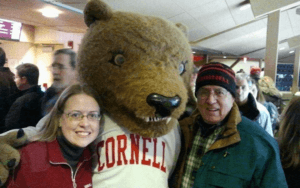Dr. A’ndrea L. Van Schoick ’96 and Kimberly A. Wagner ’85, the newest alumni-elected trustees on the Cornell University Board of Trustees, have begun their four-year terms of service. They sat down with us to share their priorities and expectations for their first year.
What will your main focus be as you enter your first term as a trustee?
Dr. A’ndrea L. Van Schoick ’96: I plan to do a lot of reading, listening, and learning. My goal is to learn more about the logistics and personality of this board, get to know the members, and understand the background of the current issues under consideration so that I can contribute efficiently and effectively, as early as possible in my tenure. I have been assigned to two committees, Academic Affairs and Alumni Affairs, and will focus on these initially. However, I want to become at least generally familiar with the work of the other committees to better understand their work and to see if there are ways in which I can be helpful, now or in the future. I have a lot of homework to do, to be sure!
Kimberly A. Wagner ’85: As a ‘freshman trustee’ I will be focusing on listening, learning, and understanding in order to get my bearings as quickly as possible. For the first year of my term, I’ve been assigned to the Student Life and Alumni Affairs Committees, where I hope to bring my unique perspective to the current issues being addressed. I am confident that there will be many opportunities to contribute and have a positive impact.
What part of your service do you expect will be the most challenging and the most rewarding?
Van Schoick: During the initial period, gaining a deeper understanding of Cornell processes and finances, and especially of the many programs and the campuses outside Ithaca with which I have had less contact previously, will provide a steep but very interesting learning curve. Over the course of my term I am sure there will be a lot of challenging issues to tackle and new skills to develop—I can’t begin to imagine the full scope just yet, but that keeps things interesting and exciting! There are so many important issues facing Cornell and the world right now and tackling any one of these would be difficult; collectively, they pose a tremendous challenge. I am confident that the board and community will rise to the task!
The knowledge that I can contribute in a meaningful way to Cornell’s present and future health is a great reward and a tremendous honor. I look forward to meeting more stakeholders within and beyond the university and developing new working relationships and friendships among them.
Wagner: Any of my friends and colleagues will tell you that I don’t like sitting still. So, I think that the most challenging part of my service is quickly coming to an end—waiting the five months between learning the election results and actually attending orientation and meetings! I expect most if not all of the of the trustee experience to be rewarding. It’s an honor and a privilege to work in service of Cornell with fellow trustees and the university administration.
How has your past experience with Cornell helped you prepare for this role?

Van Schoick: My alumni board service for Cornell, as a class, regional, college, and university-wide representative, has helped me grow into an effective contributor, consensus builder, and leader. These connections to campus have also provided an opportunity to remain current on Cornell news and developments. This background, together with the relationships I have developed with alumni, faculty, staff, students, and administrators through the years, will serve me well as I begin my tenure as a trustee. Working with a diverse and wide range of alumni over the years has opened my eyes to new perspectives and has helped me cultivate a respect for various viewpoints. I will use this experience to be a voice on the board that is as representative as possible, to help make Cornell the best for everyone.
Wagner: Over the years I have served on a number of Cornell boards and advisory councils, including county cooperative extension, the CALS Dean’s Advisory Committee, and the Atkinson Center for Sustainability. In these roles I’ve experienced both the rewards and challenges of delivering on the Land Grant mission, working across Cornell entities, and enabling Cornell-corporate collaborations. I believe these experiences have prepared me to acknowledge the complexities of Cornell, but also to know there are ways of navigating across constituencies to enable great things to happen.
What excites you about the future of Cornell?
Van Schoick: In the shorter term, the reactivation of campus and the future of Cornell within the pandemic/post-pandemic landscape makes this an exciting time to join the board. This has been a challenging time for the university, and I expect that the community will work as hard and as creatively as possible to keep moving Cornell forward. Taking a longer view, Cornell’s overall excellence and its strengths in building partnerships make it uniquely positioned to be a leader in many of the world’s pressing challenges: racial justice, climate change, One Health, and so many others. To be able to interact with the future of Cornell and its students in a new way, and to be part of such a vibrant and powerful community making great scientific and social impacts, is very exciting!
Wagner: Locally, domestically, and internationally we face a long list of intractable challenges. To a great extent, addressing these challenges requires not only new thinking but cross-functional and multi-disciplinary approaches. The pandemic has illustrated that technical solutions, no matter how profound, are not sufficient to achieve success. Cornell’s track record of breakthrough thinking and successful collaborations across technical and humanistic disciplines positions the university to take the lead in training the next generation of leaders to find solutions and have impact at both a local and global scale.


